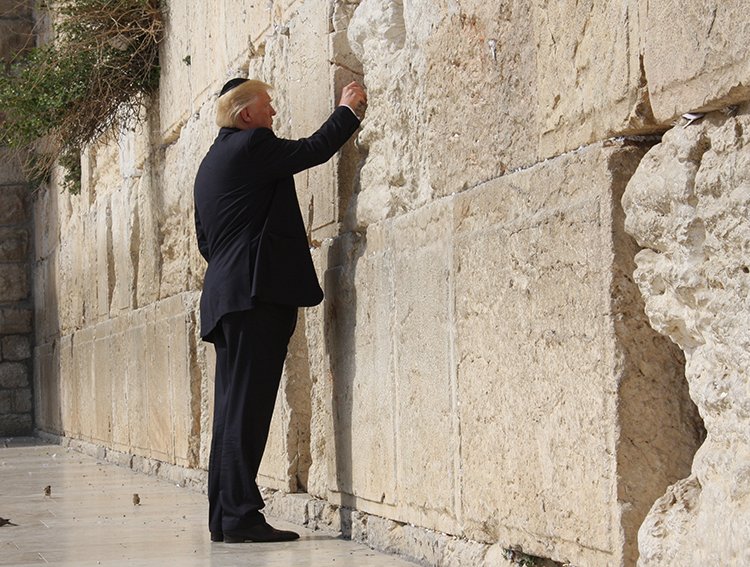In the White House’s Trump Declaration for Enduring Peace and Prosperity, the president highlighted the Middle East’s profound religious importance to Christianity, Islam, and Judaism. “We recognize the deep historical and spiritual significance of this region to the faith communities whose roots are intertwined with the land… Respect for these sacred connections and the protection of their heritage sites shall remain paramount in our commitment to peaceful coexistence.”
Days later, at a summit in Sharm El-Sheikh, Egypt, on October 13, 2025, President Donald Trump and Egyptian President Abdel-Fattah el-Sissi signed documents supporting a ceasefire to end the two-year Israel-Hamas war in Gaza. Trump framed the agreement in that same spirit, invoking the biblical patriarch Abraham as a symbol of reconciliation among the region’s peoples.
The choice of Abraham linked this new initiative to Trump’s earlier achievement, the 2020 Abraham Accords, which normalized relations between Israel and several Arab states. By reviving the same theme, Trump signaled continuity between his first-term diplomacy and his renewed push for lasting peace.
Abraham stands at the heart of the faith traditions that emerged from the Middle East. According to Genesis, he was a man of faith who left his home at God’s command and became the father of nations through his two sons, Isaac, born to Sarah, and Ishmael, born to Hagar. Jews trace their lineage through Isaac and see Abraham as the father of their nation and recipient of God’s covenant, while Christians regard him as the “father of faith,” whose trust in God made him a model for believers.
Muslims revere Ibrahim as both prophet and patriarch, tracing Arab ancestry through Ishmael, who, according to Islamic tradition, helped his father build the Kaaba in Mecca. The Quran mentions Abraham more than any figure except Moses, portraying him as a reformer who rejected idolatry and called people to worship one true God.
The story of Abraham’s willingness to sacrifice his son, stopped only by an angel, remains one of faith’s defining symbols of obedience. For Trump, choosing Abraham to represent his Middle East peace initiative underscored the shared spiritual roots of these three faiths.
The patriarch represents a time before theological divisions, a common father linking Jews, Christians, and Muslims alike. By naming the agreements the “Abraham Accords,” the architects of peace sought to remind the region that its peoples are part of one family bound by faith and ancestry.
Trump echoed this idea before the Israeli Knesset, thanking the “God of Abraham, Isaac, and Jacob,” while also praising Arab and Muslim partners who joined the peace process.
In this sense, invoking Abraham is both symbolic and strategic. It reframes normalization and reconciliation not as a political transaction between adversaries but as a family reunion among the children of the same patriarch—a message of unity at the heart of Trump’s vision for Middle East peace.
Former senior adviser Aryeh Lightstone, one of the architects of the 2020 Abraham Accords, recalled the historic day when Israel and the United Arab Emirates agreed to normalize relations under U.S. mediation. The name “Abraham Accords” was suggested by U.S. Army Gen. Miguel Correa during a White House meeting with Jared Kushner and other senior Trump officials. The choice immediately resonated because Abraham is the shared patriarch of Judaism, Christianity, and Islam, giving the agreement spiritual weight and historic symbolism.
Following the signing ceremony, Lightstone was tasked with implementing the accords, beginning with the first direct flight from Israel to the UAE and rapid negotiations on trade and banking agreements. He said the accords fundamentally changed the Middle East “lexicon,” from asking if Arab countries would make peace with Israel to asking when.
Lightstone believes the United States should continue expanding the accords through deeper defense and economic ties between Israel and the participating Arab nations, including Bahrain, Morocco, Sudan, and Kosovo. He warned that Washington’s ambiguity under the Biden administration, particularly its dealings with Iran, made regional allies uncertain about America’s long-term commitment.
“The idea of the Abraham Accords,” Lightstone said, “was that if you want to level up your relationship with America, you should level up your relationship with Israel.”
While Abraham serves as a unifying symbol, recognized and revered by Jews, Christians, and Muslims alike, invoking his name can also be polarizing. This tension arises from their fundamentally different understandings of what Abraham represents and who his true inheritors are.
The Quran presents Abraham as the first Muslim, predating Judaism and Christianity, while Jewish and Christian traditions see him as the founding patriarch of their own covenantal relationships with God. Each faith interprets Abraham through its own theological lens, making him simultaneously a bridge and a point of contention.
The most important thing at this moment is that the fighting between Hamas and Israel has stopped, and the hostages have been returned home. Whether the ceasefire will hold, and whether other Arab nations will choose to move forward with the Abraham Accords and normalize relations with Israel, remains to be seen. For now, however, the situation is moving in a better direction than it has in a long time.
Read the full article here


